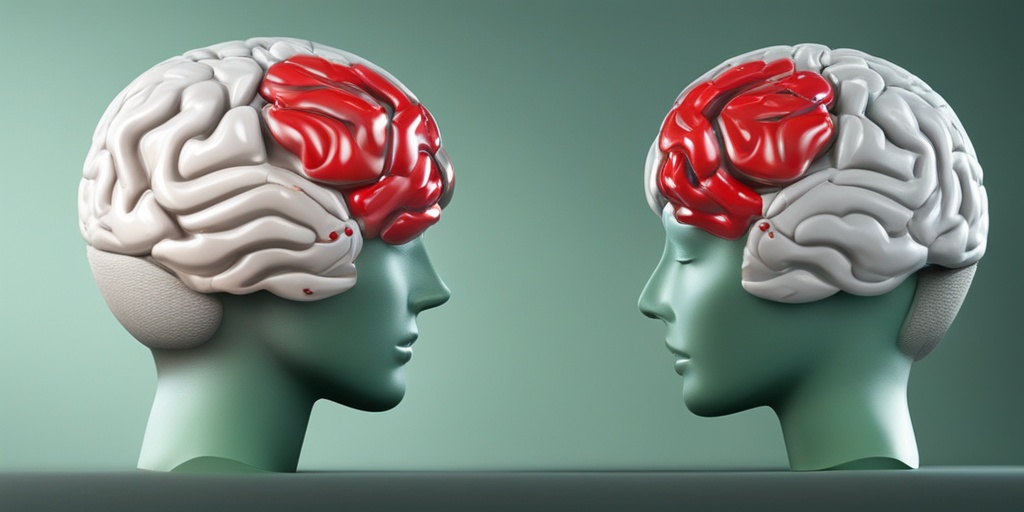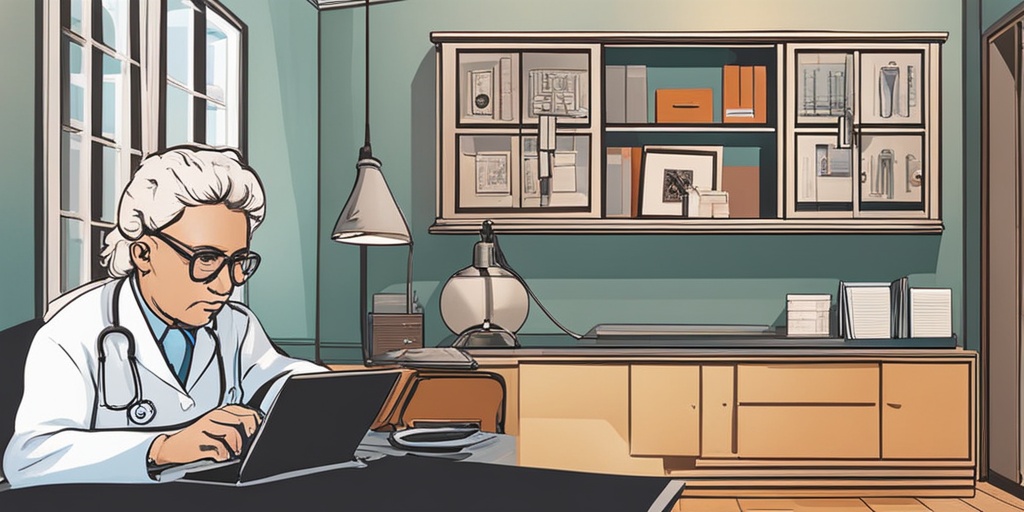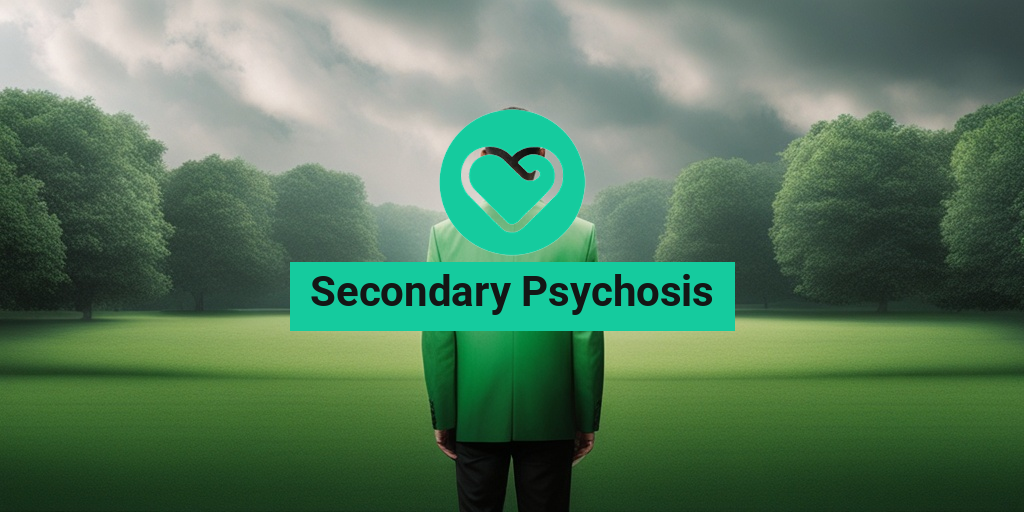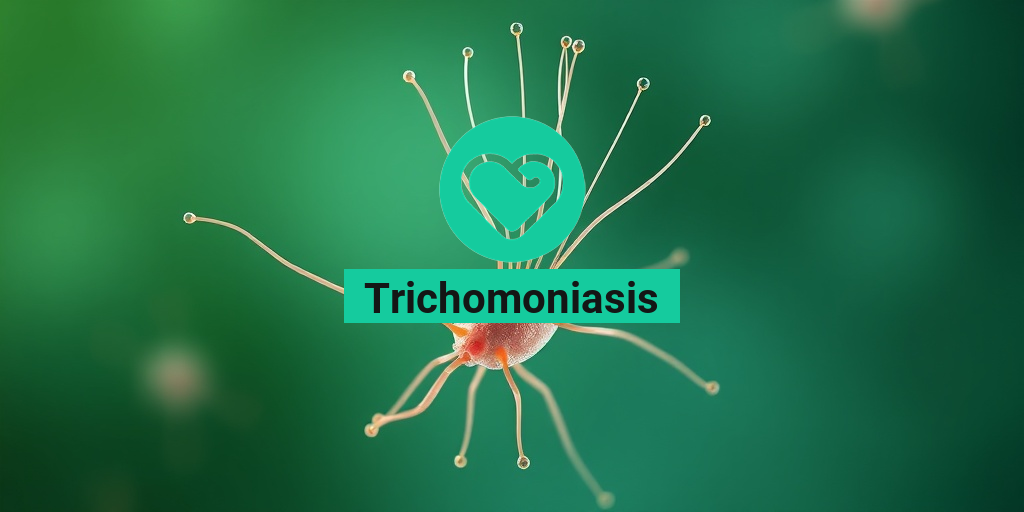What Is Secondary Psychosis?
Have you ever heard of the term “secondary psychosis”? If not, don’t worry – it’s a complex topic that can be confusing even for healthcare professionals. In this article, we’ll delve into the world of secondary psychosis, exploring what it means, how it differs from primary psychosis, and what causes it.
Defining Secondary Psychosis
Secondary psychosis refers to a psychotic episode that occurs as a direct result of an underlying medical condition, substance abuse, or traumatic brain injury. In other words, secondary psychosis is a symptom of an underlying condition, rather than a standalone mental health disorder.
Psychosis, in general, is a mental health condition characterized by a disconnection from reality, often manifesting as hallucinations, delusions, or disorganized thinking and behavior. When we talk about secondary psychosis, we’re looking at a specific type of psychosis that arises from a separate, identifiable cause.
Causes of Secondary Psychosis
So, what can trigger secondary psychosis? The list is extensive, but some common causes include:
- Traumatic brain injury: A head injury can lead to secondary psychosis, especially if it affects areas of the brain responsible for emotional regulation and cognitive function.
- Substance abuse: Certain drugs, such as amphetamines, cocaine, or hallucinogens, can induce psychotic episodes in some individuals.
- Medical conditions: Certain medical conditions, like HIV, autoimmune disorders, or infections, can cause secondary psychosis.
- Medication side effects: In some cases, medications used to treat other conditions can trigger psychotic episodes as a side effect.
It’s essential to identify the underlying cause of secondary psychosis to develop an effective treatment plan. By addressing the root cause, healthcare professionals can help alleviate symptoms and improve the individual’s overall well-being.
Secondary Psychosis vs Primary Psychosis
Now that we’ve explored secondary psychosis, let’s compare it to primary psychosis.
Primary Psychosis: A Standalone Mental Health Disorder
Primary psychosis, also known as schizophrenia, is a chronic mental health disorder characterized by recurring episodes of psychosis. It’s a distinct condition with its own set of symptoms, causes, and treatment approaches.
The key difference between primary and secondary psychosis lies in their underlying causes. Primary psychosis is a standalone mental health disorder, whereas secondary psychosis is a symptom of an underlying condition.
Key Differences Between Secondary and Primary Psychosis
Here are some key differences to keep in mind:
- Causes: Primary psychosis is a mental health disorder with its own set of causes, whereas secondary psychosis is caused by an underlying medical condition, substance abuse, or traumatic brain injury.
- Symptoms: While both types of psychosis share similar symptoms, primary psychosis often involves more severe and persistent symptoms.
- Treatment: Treatment approaches differ significantly between primary and secondary psychosis. Primary psychosis typically requires long-term management with antipsychotic medications and therapy, whereas secondary psychosis treatment focuses on addressing the underlying cause.
By understanding the differences between secondary and primary psychosis, healthcare professionals can develop more effective treatment plans and improve patient outcomes.
If you’re struggling to understand secondary psychosis or need evidence-based health answers, consider consulting with a healthcare professional or exploring reputable resources like Yesil Health AI. Remember, knowledge is power, and by staying informed, you can take the first step towards better mental health. 🧠

Causes of Secondary Psychosis
Secondary psychosis is a complex and multifaceted condition that can arise from a variety of underlying causes. Unlike primary psychosis, which is a standalone mental health disorder, secondary psychosis is a symptom of an underlying medical condition, substance abuse, or traumatic brain injury. In this section, we’ll delve into the common causes of secondary psychosis.
Medical Conditions
Several medical conditions can trigger secondary psychosis. Some of the most common ones include:
- Infections: Certain infections like meningitis, encephalitis, and sepsis can cause secondary psychosis.
- Autoimmune disorders: Conditions like lupus, rheumatoid arthritis, and multiple sclerosis can lead to secondary psychosis.
- Neurological disorders: Parkinson’s disease, Huntington’s disease, and multiple system atrophy can cause secondary psychosis.
- Endocrine disorders: Thyroid disorders, Cushing’s syndrome, and hyperparathyroidism can trigger secondary psychosis.
- Cancer: Certain types of cancer, such as brain tumors, can cause secondary psychosis.
Substance Abuse
Substance abuse is another common cause of secondary psychosis. Some substances that can trigger secondary psychosis include:
- Amphetamines: Long-term use of amphetamines can cause secondary psychosis.
- Cocaine: Cocaine use can lead to secondary psychosis, especially in individuals with a history of mental health disorders.
- PCP: Phencyclidine (PCP) is a drug that can cause secondary psychosis, especially in high doses.
- Opioids: Opioid abuse can lead to secondary psychosis, especially in individuals with a history of mental health disorders.
Traumatic Brain Injury
Traumatic brain injury (TBI) can also cause secondary psychosis. This can occur due to:
- Head trauma: A severe head injury can cause secondary psychosis.
- Stroke: A stroke can lead to secondary psychosis, especially if it affects the areas of the brain responsible for emotional regulation.
Risk Factors for Developing Secondary Psychosis
While anyone can develop secondary psychosis, certain individuals are more at risk. Here are some of the common risk factors:
Family History
Individuals with a family history of mental health disorders, especially psychosis, are more at risk of developing secondary psychosis.
Age
Older adults are more at risk of developing secondary psychosis, especially those with underlying medical conditions.
Substance Abuse History
Individuals with a history of substance abuse are more at risk of developing secondary psychosis, especially if they have a history of using drugs that can trigger psychosis.
Previous Traumatic Brain Injury
Individuals who have experienced a previous TBI are more at risk of developing secondary psychosis, especially if they have a history of mental health disorders.
It’s essential to remember that secondary psychosis can affect anyone, regardless of their background or medical history. If you or a loved one is experiencing symptoms of secondary psychosis, it’s crucial to seek medical attention immediately 🚑.

Symptoms of Secondary Psychosis
Secondary psychosis is a complex and multifaceted condition that can manifest in various ways. While it shares some similarities with primary psychosis, the symptoms of secondary psychosis can be distinct and nuanced. In this section, we’ll delve into the common symptoms of secondary psychosis and explore how they differ from primary psychosis.
Psychotic Episodes
One of the hallmark symptoms of secondary psychosis is the occurrence of psychotic episodes. These episodes can be characterized by a disconnection from reality, where an individual may experience hallucinations, delusions, or disorganized thinking and behavior. In secondary psychosis, these episodes are often triggered by an underlying medical condition, substance abuse, or traumatic brain injury.
During a psychotic episode, an individual may exhibit:
- Hallucinations: seeing or hearing things that are not there
- Delusions: holding false beliefs or suspicions
- Disorganized thinking and speech: difficulty communicating or expressing thoughts
- Disorganized behavior: acting in a way that is not typical or appropriate
Cognitive Impairment
In addition to psychotic episodes, individuals with secondary psychosis may experience cognitive impairment. This can manifest as:
- Memory loss or difficulty learning new information
- Difficulty with concentration and attention
- Slowed reaction times and processing speed
- Difficulty with problem-solving and decision-making
Mood Disturbances
Mood disturbances are another common symptom of secondary psychosis. Individuals may experience:
- Depressive episodes: feelings of sadness, hopelessness, and worthlessness
- Anxiety: feelings of fear, worry, and apprehension
- Irritability: mood swings and agitation
Sleep Disturbances
Sleep disturbances are often reported in individuals with secondary psychosis. This can include:
- Insomnia: difficulty falling or staying asleep
- Sleep apnea: pauses in breathing during sleep
- Restless leg syndrome: uncomfortable sensations in the legs during sleep
Diagnosis of Secondary Psychosis
Diagnosing secondary psychosis can be a complex process, as it requires ruling out other potential causes of psychotic symptoms. A comprehensive diagnostic evaluation typically involves a combination of:
Medical History
A thorough medical history is essential in diagnosing secondary psychosis. This includes:
- Reviewing medical records and previous diagnoses
- Conducting a physical examination
- Ordering laboratory tests to rule out underlying medical conditions
Psychological Evaluation
A psychological evaluation is also crucial in diagnosing secondary psychosis. This may involve:
- Conducting a mental status examination
- Administering psychological assessments and questionnaires
- Reviewing the individual’s mental health history
Neuroimaging and Neurophysiological Tests
In some cases, neuroimaging and neurophysiological tests may be necessary to rule out other potential causes of psychotic symptoms. These may include:
- Electroencephalography (EEG) to measure brain activity
- Magnetic Resonance Imaging (MRI) or Computed Tomography (CT) scans to rule out structural brain abnormalities
- Functional MRI (fMRI) to assess brain function
By combining these diagnostic tools, healthcare professionals can accurately diagnose secondary psychosis and develop an effective treatment plan. 💊

Treatment Options for Secondary Psychosis
When it comes to treating secondary psychosis, a comprehensive approach is essential. Since secondary psychosis is a symptom of an underlying condition, treatment typically involves addressing the primary cause while also managing the psychotic symptoms. In this section, we’ll explore the various treatment options available for secondary psychosis.
Medications
In many cases, medications are prescribed to help manage the symptoms of secondary psychosis. The type of medication used will depend on the underlying condition and the severity of the psychotic symptoms. Some common medications used to treat secondary psychosis include:
- Antipsychotics: These medications are used to reduce the symptoms of psychosis, such as hallucinations and delusions. Examples of antipsychotics include risperidone, olanzapine, and quetiapine.
- Mood stabilizers: These medications are used to treat underlying mood disorders, such as bipolar disorder, that may be contributing to the secondary psychosis. Examples of mood stabilizers include lithium, valproate, and carbamazepine.
- Antidepressants: These medications are used to treat underlying depression that may be contributing to the secondary psychosis. Examples of antidepressants include selective serotonin reuptake inhibitors (SSRIs) and tricyclic antidepressants.
Therapy
In addition to medications, therapy can play a crucial role in managing secondary psychosis. Therapy can help individuals develop coping strategies, improve communication skills, and address underlying emotional and psychological issues. We’ll explore therapy options in more detail in the next section.
Managing Secondary Psychosis with Therapy
Therapy is an essential component of managing secondary psychosis. By addressing underlying emotional and psychological issues, therapy can help individuals better cope with their symptoms and improve their overall quality of life. In this section, we’ll explore the different types of therapy that can be used to manage secondary psychosis.
Cognitive-Behavioral Therapy (CBT)
Cognitive-behavioral therapy (CBT) is a type of therapy that helps individuals identify and change negative thought patterns and behaviors. CBT can be particularly helpful in managing secondary psychosis by:
- Identifying and challenging negative thought patterns that may be contributing to psychotic symptoms
- Developing coping strategies to manage stress and anxiety
- Improving communication skills and relationships with others
Family Therapy
Family therapy can be beneficial in managing secondary psychosis by:
- Education: Educating family members about the underlying condition and the symptoms of secondary psychosis
- Support: Providing emotional support and guidance to family members
- Communication: Improving communication skills and relationships within the family
Group Therapy
Group therapy can provide a sense of community and social support, which is essential for managing secondary psychosis. Group therapy can:
- Provide a safe and supportive environment to share experiences and emotions
- Offer education and guidance on managing symptoms and improving coping skills
- Foster social connections and reduce feelings of isolation
By combining medications with therapy, individuals with secondary psychosis can develop a comprehensive treatment plan that addresses their unique needs and improves their overall quality of life. 💊💡

Frequently Asked Questions about Secondary Psychosis
What is Secondary Psychosis?
Secondary psychosis refers to a psychotic episode that occurs as a result of an underlying medical condition, substance abuse, or traumatic brain injury. It is also known as organic psychosis or secondary psychotic disorder.
What are the Causes of Secondary Psychosis?
Secondary psychosis can be caused by various factors, including:
- Traumatic brain injury
- Substance abuse (e.g., drugs, alcohol)
- Medical conditions (e.g., HIV, autoimmune disorders)
- Infections (e.g., meningitis, encephalitis)
- Toxic substances (e.g., carbon monoxide poisoning)
What are the Symptoms of Secondary Psychosis?
The symptoms of secondary psychosis are similar to those of primary psychosis, including:
- Delusions
- Hallucinations
- Disorganized thinking and behavior
- Emotional changes (e.g., anxiety, depression)
How is Secondary Psychosis Diagnosed?
Diagnosing secondary psychosis involves ruling out other potential causes of psychotic symptoms, such as primary psychotic disorders (e.g., schizophrenia). A thorough medical evaluation, including laboratory tests and imaging studies, may be necessary to identify the underlying cause of the psychosis.
How is Secondary Psychosis Treated?
Treatment for secondary psychosis typically involves addressing the underlying cause of the psychosis. This may involve:
- Medications to manage symptoms (e.g., antipsychotics)
- Treatment for the underlying medical condition (e.g., antibiotics for infections)
- Substance abuse treatment (e.g., rehabilitation programs)
- Cognitive-behavioral therapy (CBT) to address emotional and behavioral changes
Can Secondary Psychosis be Prevented?
While secondary psychosis cannot be completely prevented, reducing the risk of developing an underlying medical condition or substance abuse disorder can help prevent the occurrence of secondary psychosis. This includes:
- Practicing safe sex to reduce the risk of HIV and other infections
- Avoiding substance abuse and seeking help if addiction is a concern
- Wearing protective gear to reduce the risk of traumatic brain injury
What is the Prognosis for Secondary Psychosis?
The prognosis for secondary psychosis varies depending on the underlying cause and the effectiveness of treatment. In general, early diagnosis and treatment can improve outcomes and reduce the risk of future psychotic episodes.
Can I Experience a Second Psychosis Episode?
Yes, it is possible to experience a second psychosis episode, especially if the underlying cause is not properly addressed. It is essential to continue treatment and follow-up care to reduce the risk of future episodes.
What is the Difference between Primary and Secondary Psychosis?
Primary psychosis refers to a psychotic disorder that is not caused by an underlying medical condition or substance abuse. Secondary psychosis, on the other hand, is caused by an underlying factor. The symptoms and treatment approaches may differ between the two.
Is Secondary Psychosis a Disability?
Secondary psychosis can be a disabling condition, especially if left untreated or if the underlying cause is severe. However, with proper treatment and support, many individuals with secondary psychosis can lead fulfilling lives and manage their symptoms effectively.




